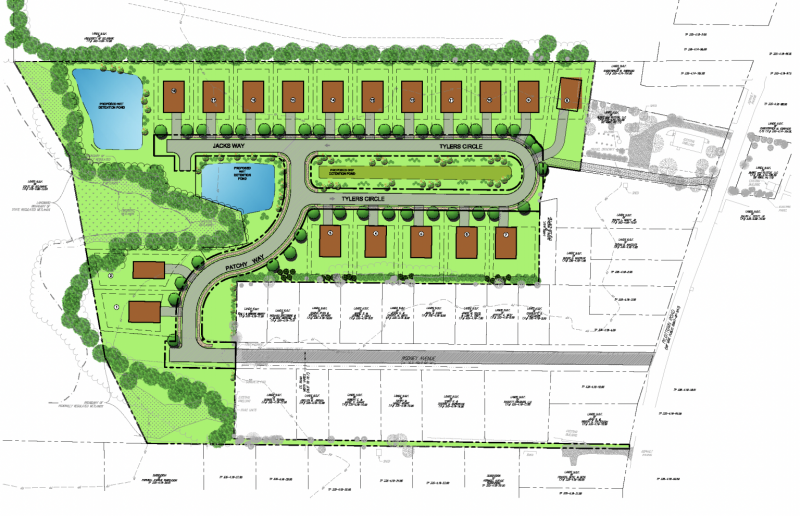The plan for the controversial Fisher’s Cove development did not receive a favorable response from the Lewes Planning Commission Sept. 1, as commissioners voted 5-1 to recommend denial.
The matter will now go before Lewes Mayor and City Council, which may choose to approve, deny or remand the application. Fisher’s Cove was already sent back to the planning commission once before.
Developer Burke and Rutecki LLC is seeking preliminary consent on its plan to build 18 single-family homes on an 11-acre parcel off Rodney Avenue near the University of Delaware.
The application has been criticized by the public for being proposed in a flood-prone area while using a small, dead-end road for access to the community.
Commission Chairman Drew McKay said the city should not unduly harm an existing neighborhood by approving a new development.
“Allowing the expansion of Rodney [Avenue] as proposed dramatically affects the neighborhood in a negative way, in my opinion,” he said.
As for the flooding concerns, McKay said the proposed stormwater management plan does not quell any fears of negative impact on neighbors. He said a holistic approach to analyzing water issues is long overdue in Lewes.
Commissioner Melanie Moser made the motion to recommend denial of the application, listing several reasons why the proposed project does not satisfy requirements in the city’s code. Like McKay, she said the impact on Rodney Avenue residents would be too great.
As the only access point to the parcel, the developer has proposed bringing Rodney Avenue up to city standards, including widening the roadway from 18 feet to 24 feet, the minimum width allowed by city code, and adding 9-foot drainage swales on both sides of the roadway to provide stormwater management for a road that currently has none.
“Rodney Avenue improvements involve significant impact on quality of life of residents,” Moser said. “This is a strongly knit community that will be highly disturbed by this.”
Commissioner Tom Jensen was opposed to the plan for three reasons – lack of compliance with floodplain ordinances, loss of mature trees in an environmentally sensitive area, and because the plan goes against several of the city’s core values.
“Wrong plan, wrong location, wrong time,” he said.
Commissioner Joe Hoechner was the lone vote in favor of the plan. He said he believes in science and engineering, and not the fear and mistruths he says he heard from residents at the July 12 public hearing.
“I find it amazing that many neighbors say we shouldn’t build in the floodplain and they actually live in that very same floodplain overlooking the site,” he said. “I’ve seen pictures of flooding at the end of Rodney. I wonder how much of that is caused by the neighbors, by their uncontrolled runoff from their houses and from their streets.”
This is the second time the planning commission has recommended denial of Fisher’s Cove. The first vote came in November 2019. In April 2020, mayor and city council decided to send the application back to the planning commission instead of voting to approve or deny preliminary consent. The developer then reworked the plan, including engineering a stormwater plan that was approved by Sussex Conservation District, before submitted the revised plan to the city for reconsideration earlier this year.
After the last planning commission recommendation of denial, the developer questioned the intentions of some members of the planning commission, who they said were biased against the application. Three members of the planning commission recused themselves from the issue this time around out of an abundance of caution.
Developer responds
Developer’s attorney Tim Willard said the commission’s opposition to the application was not a surprise.
“There seems to be a clear bias among some of the commissioners against this project,” he said. “Their reasoning is inconsistent with other approvals, and deviates from the code and case law to satisfy a special interest.”
Instead of addressing council’s specific questions when it remanded the project to planning commission, Willard said McKay instructed the planning commission members that all aspects of the application beyond council's specific concerns were before the commission. “The commission ignored their own planning officer’s report that the applicant had answered the issues council requested,” Willard said. “Indeed, the commission even disregarded their own engineer’s report and Sussex Conservation District’s final approval. Both stated the application would have no negative effect regarding stormwater and flooding on adjacent properties.”
Willard said those against the project had no engineers.
“Every engineer that has reviewed this project has stated the stormwater management facilities meet or exceed the code requirements,” Willard said. “The applicant has spent over two years engineering this property beyond what should be required at this preliminary stage. Each commissioner who voted to recommend rejection seemed to rely on wish lists for future law and on facts that were not accurate. The property is zoned for residential use; this was not a change of zone application. The applicant looks forward to making its case before the council.”
Burke & Rutecki principal Justin Healy said the commission based its decision on flawed and inaccurate information.
“There are too many inaccuracies to list, but for example as a reason to deny, the chairman stated, ‘The other surrounding developments have larger lots that have additional pervious area than the proposed lots.’ This is not correct – of the 10 lots from Rodney Avenue that border Fisher’s Cove, only one is above 10,000 square feet, while the majority are 6,960 square feet, significantly less than all of our lots.”
Healy said he and his team have gone out of their way to improve the stormwater management situation for neighboring properties.
“We are really disappointed that after three years of carefully planning a site that not only conforms to all current codes but also thoughtfully works to help the neighboring residents have some stormwater management – as there currently is none – the LPC made this decision,” he said. “After all the time and money spent, it was clear that many of the commissioners disregarded the city engineer’s approval, SCD’s approval and our engineering.”
Nick Roth is the news editor. He has been with the Cape Gazette since 2012, previously covering town beats in Milton and Lewes. In addition to serving on the editorial board and handling page layout, Nick is responsible for the weekly Delaware History in Photographs feature and enjoys writing stories about the Cape Region’s history. Prior to the Cape Gazette, Nick worked for the Delmarva Media Group, including the Delaware Wave, Delaware Coast Press and Salisbury Daily Times. He also contributed to The News Journal. Originally from Boyertown, Pa., Nick attended Shippensburg University in central Pennsylvania, graduating in 2007 with a bachelor’s degree in journalism. He’s won several MDDC awards during his career for both writing and photography. In his free time, he enjoys golfing, going to the beach with his family and cheering for Philadelphia sports teams.





















































